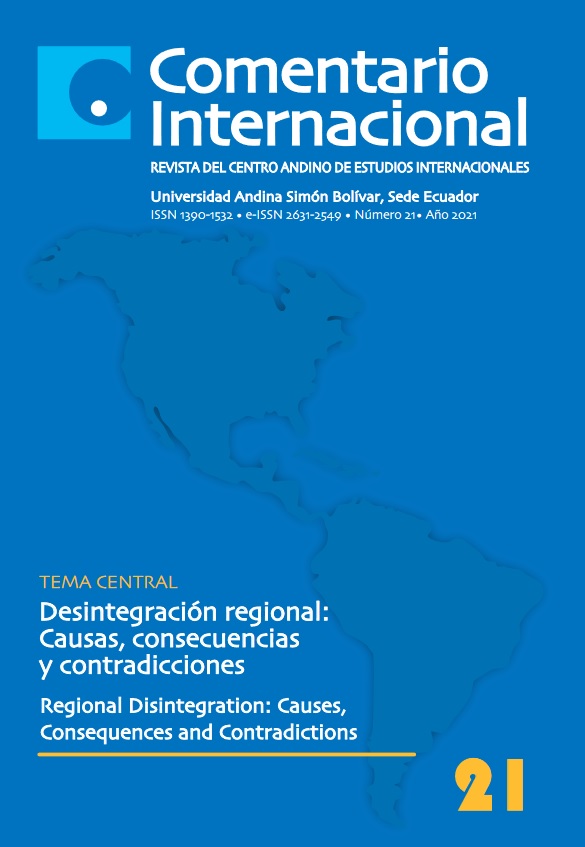La participación de Sudáfrica en la suspensión de Zimbabue de la Mancomunidad de Naciones
Contenido principal del artículo
Resumen
Este artículo analiza la suspensión de Zimbabue de la Mancomunidad Británica de Naciones y los incansables esfuerzos de Sudáfrica y sus socios regionales para levantarla, en el contexto de continuas refutaciones de Estados como el Reino Unido y Australia. Nuestra investigación identifica los motivos subyacentes de la suspensión declarada, así como el razonamiento detrás de la polarización de las naciones sobre la plétora de problemas que plagaron a Zimbabue a principios de la década de 2000. Además, cubrimos tangencialmente temas como el equilibrio de poder dentro de la Commonwealth, las interpretaciones globales de la democracia entre el Norte y el Sur —y las realidades que producen— y la razón fundamental detrás de las narrativas poscoloniales. En nuestro esfuerzo, hemos utilizado una serie de fuentes literarias primarias y secundarias. Concluimos que Sudáfrica dio primacía a sus propios objetivos de política exterior y, por lo tanto, permitió que la democracia siguiera desintegrándose en Zimbabue. Lo que está a punto de leer carece deliberadamente de la estructura clásica que cabría esperar, ya que consideramos que el estilo elegido para organizar la información se adapta mejor al público en general y a las lecturas especializadas por igual.
##plugins.themes.bootstrap3.displayStats.downloads##
Detalles del artículo
Sección

Esta obra está bajo una licencia internacional Creative Commons Atribución-NoComercial 4.0.
Los autores que publiquen en esta revista aceptan las siguientes condiciones:
1. Los autores conservan los derechos de autor y ceden a la revista Comentario Internacional el derecho de la primera publicación, con el trabajo registrado con la licencia de atribución de Creative Commons, que permite a terceros utilizar lo publicado siempre que mencionen la autoría del trabajo y a la primera publicación en esta revista.
2. Los autores pueden realizar otros acuerdos contractuales independientes y adicionales para la distribución no exclusiva de la versión del artículo publicado en esta revista (p. ej., incluirlo en un repositorio institucional o publicarlo en un libro) siempre que indiquen claramente que el trabajo se publicó por primera vez en Comentario Internacional.
Cómo citar
Referencias
Barber, James. “The New South Africa’s Foreign Policy: Principles and Practice”. International Affairs 81, n.° 5 (2005): 1079-96. https://doi.org/10.1111/j.1468-2346.2005.00503.x.
Bond, Patrick. South Africa and Global Apartheid: Continental and International Policies and Politics. Uppsala, SE: Nordic Africa Institute, 2004.
Chakwera, Lazarus. “Statement by His Excellency Dr. Lazarus McCarthy Chakwera, President of the Republic of Malawi, and Chairperson of SADC, Calling for the Lifting of All Sanctions Imposed on The Republic of Zimbabwe”. Southern African Development Community. October 25th, 2021. https://bit.ly/3Yz8q2I .
Chan, Stephen. Grasping Africa: A Tale of Achievement and Tragedy. London: IB Tauris, 2007.
Chinaka, Chris, and Ed Johnson. “Mugabe: Commonwealth is ‘Animal Farm’”. The Independent. December 7th, 2003. parr. 10, https://bit.ly/422CbvH.
Commonwealth Secretariat. Meeting of Commonwealth Chair Persons’ Committee on Zimbabwe. Press release 02/26, March 19th, 2002. https://bit.ly/421QOzs.
—. Zimbabwe Presidential Elections, 9-12 March 2002: The Report of the Commonwealth Observer Group. London: Commonwealth Secretariat, 2003.
Dahl, Robert. Polyarchy: Participation and Opposition. Yale, US: Yale University Press, 1973.
Dowden, Richard. “Blair Fails to Reach Commonwealth Agreement on Zimbabwe Exclusion”. The Independent. December 6th, 2003. https://bit.ly/3T9j4fh.
Drezner, Daniel. “Introduction: The Interaction of Domestic and International Institutions”. In Locating the Proper Authorities: The Interaction of Domestic and International Institutions, edited by Daniel Drezner, 1-22. Ann Arbor, US: University of Michigan Press, 2003.
Graham, Suzanne. Democratic South Africa’s Foreign Policy: Voting Behaviour in the United Nations. London: Palgrave Macmillan, 2016.
Hatchard, John, Muna Ndulo and Peter Slinn. Comparative Constitutionalism and Good Governance in the Commonwealth: An Eastern and Southern African Perspective. London: Cambridge University Press, 2004.
Johnston, Alastair. “Treating International Institutions as Social Environment”. International Studies Quarterly 45, n.° 4 (2001): 487-515. https://doi.org/10.1111/0020-8833.00212.
Keohane, Robert. After Hegemony: Cooperation and Discord in the World Political Economy. Princeton, US: Princeton University Press, 1984.
Kissinger, Henry. Diplomacy. New York: Simon & Schuster, 1994. Mail & Guardian. “Minty’s Broadside Startles Diplomats”. Mail & Guardian. February 13th, 2003. https://bit.ly/3LaFLOq.
Mbeki, Thabo. “We Will Resist the Upside-Down View of Africa”. The Insider. 2003. https://bit.ly/3mGpXsu.
Mearsheimer, John. “The False Promise of International Institutions”. International Security 19, n.° 3 (1994/1995): 5-49. https://doi.org/10.2307/2539078.
Nathan, Laurie. “Consistency and Inconsistencies in South Africa’s Foreign Policy in Africa”. International Affairs 81, n.° 2 (2005): 361-72. https://doi.org/10.1111/j.1468-2346.2005.00455.x.
News24. “‘Mbeki Could Harm Nepad’”. News24. December 8th, 2003. https://bit.ly/3ysQiNp.
Nye, Joseph, Jr. Bound to Lead: The Changing Nature of American Power. New York: Basic Books, 1990.
Obasanjo, Olusegun. “Nigeria Calls on Australia to Reinstate Zimbabwe in Commonwealth: Olusegun Obasanjo’s Letter to John Howard”. Southern African Regional Poverty Network. February 12th, 2002. https://bit.ly/3T7Rijq.
Orbán, Viktor. “Prime Minister Viktor Orbán’s Speech at the 25th Bálványos Summer Free University and Student Camp”. Magyarország Jobban Teljesít. July 26th, 2014. https://bit.ly/2wubZze.
Petrica, Dan. “Discursive Struggle and Social Change in South Africa in the Mid 1990’s”. Analele Universit??ii din Oradea 8 (2016): 171-80. https://bit.ly/3l1sg9d.
—. “Quiet Diplomacy: South Africa’s Way of Dealing with Zimbabwe during the Presidency of Thabo Mbeki”. Studia Universitatis Babe?-Bolyai - Studia Europaea 4 (2016): 151-65. https://bit.ly/3LeZ0Gw.
Sartori, Giovanni. The Theory of Democracy Revisited. Chatham, UK: Chatham House, 1987.
South African Observer Mission. “Interim Statement by the South African Observer Mission on the Zimbabwean Presidential Elections”. Department of International Relations and Cooperation of South Africa. March 13th, 2002. https://bit.ly/3LcEsyj.
Ian. “‘The Devilish Thing': The Commonwealth and Zimbabwe’s Dénouement”. The Round Table. The Commonwealth Journal of International Affairs 94, n.° 380 (2005): 367-80. https://doi.org/10.1080/00358530500174630.
United Nations Office of the High Commissioner for Human Rights. “Preliminary Findings of the Visit to the Republic of Zimbabwe by the Special Rapporteur on the Negative Impact of Unilateral Coercive Measures on the Enjoyment of Human Rights”. United Nations Office of the High Commissioner for Human Rights. Document 2063260, October 28th, 2021. https://bit.ly/3J9lqqb.
Wenbin, Wang. “Foreign Ministry Spokesperson Wang Wenbin’s Regular Press Conference on November 1, 2021”. Ministry of Foreign Affairs of the People’s Republic of China. November 1st, 2021. https://bit.ly/3l6gQRn.
Zakaria, Fareed. “The Rise of Illiberal Democracy”. Foreign Affairs 76, n.° 6 (1997): 22-43. https://bit.ly/2LRzTKJ.


